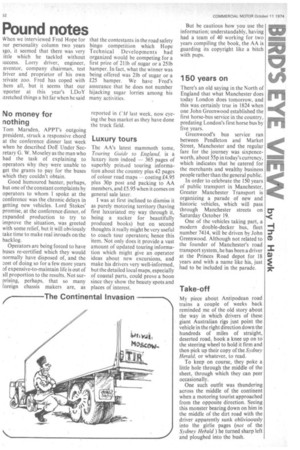Pound notes
Page 54

If you've noticed an error in this article please click here to report it so we can fix it.
When we interviewed Fred Hope for 3ur personality column two years igo, it seemed that there was very ittle which he tackled without ;uccess. Lorry driver, engineer, nventor, company chairman, test friver and proprietor of his own 3rivate zoo. Fred has coped with .hem all, but it seems that our reporter at this year's LDoY aretched things a bit far when he said
No money for nothing
Tom Marsden, APPT's outgoing president, struck a responsive chord at the conference dinner last week when he described DoE Under Secretary G. W. Moseley as the man who had the task of explaining to operators why they were unable to get the grants to pay for the buses which they couldn't obtain.
Good humoured banter, perhaps, but one of the constant complaints by operators to whom I spoke at the conference was the chronic delays in getting new vehicles. Lord Stokes' promise, at the conference dinner, of expanded production to try to improve the situation, was greeted with some relief, but it will obviously take time to make real inroads on the backlog.
Operators are being forced to have buses re-certified which they would normally have disposed of, and the cost of doing so for a few more years Df expensive-to-maintain life is out of 111 proportion to the results. Not surprising, perhaps, that so many foreign chassis makers are, as that the contestants in the road safety bingo competition which Hope Technical Developments had organized would be competing for a first prize of 211b of sugar or a 251b hamper. In fact, what the winner was being offered was 21b of sugar or a £25 hamper. We have Fred's assurance that he does not number hijacking sugar lorries among his many activities.
reported in CM last week, now eyeing the bus market as they have done the truck field.
Luxury tours
The AA's latest mammoth tome, Touring Guide to England, is a luxury item indeed — 365 pages of superbly prinked touring information about the country plus 42 pages of colour road maps -costing £4.95 plus 30p post and packing to AA members, and £5.95 when it comes on general sale later.
I was at first inclined to dismiss it as purely motoring territory (having first luxuriated my way through it, being a sucker for beautifully produced books) but on second thoughts it really might be very useful to coach tour operators; hence this item. Not only does it provide a vast amount of updated touring information which might give an operator ideas about new excursions, and make his drivers very well-informed, but the detailed local maps, especially of coastal parts, could prove a boon since they show the beauty spots and places of interest. But be cautious how you use the information; understandably, having had a team of 40 working for two years compiling the book, the AA is guarding its copyright like a bitch with pups.
150 years on
There's an old saying in the North of England that what Manchester does today London does tomorrow, and this was certainly true in 1824 when one John Greenwood established the first horse-bus service in the country, predating London's first horse bus by five years.
Greenwood's bus service ran between Pendleton and Market Street, Manchester and the regular fare for the journey was sixpenceworth, about 55p in today's currency, which indicates that he catered for the merchants and wealthy business people rather than the general public.
In order to celebrate the 150 years of public transport in Manchester, Greater Manchester Transport is organizing a parade of new and historic vehicles, which will pass through Manchester streets on Saturday October 19.
One of the vehicles taking part, a modern double-decker bus, fleet number 7414, will be driven by John Greenwood. Although not related to the founder of Manchester's road transport system, he has been a driver at the Princes Road depot for 18 years and with a name like his, just had to be included in the parade.
Take-off
My piece about Antipodean road trains a couple of weeks back reminded me of the old story about the way in which drivers of these giant Australian rigs just point the vehicle in the right direction down the hundreds of miles of straight, deserted road, hook a knee up on to the steering wheel to hold it firm and then pick up their copy of the Sydney Herald, or whatever, to read.
To keep on course, they poke a little hole through the middle of the sheet, through which they can peer occasionally.
One such outfit was thundering across the middle of the continent when a motoring tourist approached from the opposite direction. Seeing this monster bearing down on him in the middle of the dirt road with the driver apparently sunk oblivioously into the girlie pages (not of the Sydney Hetald) he turned sharp left and ploughed into the bush.




























































































































































